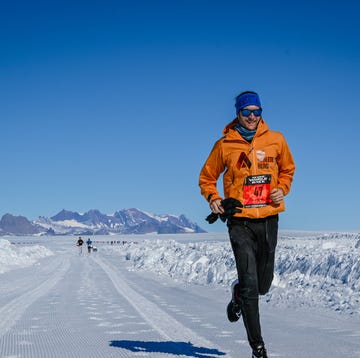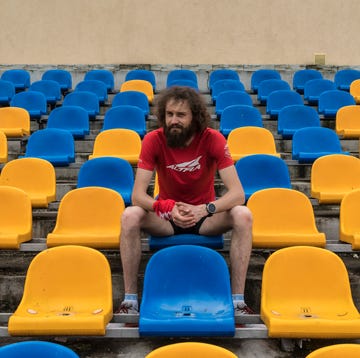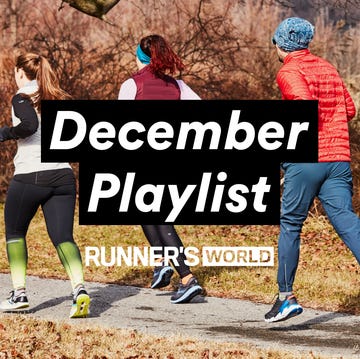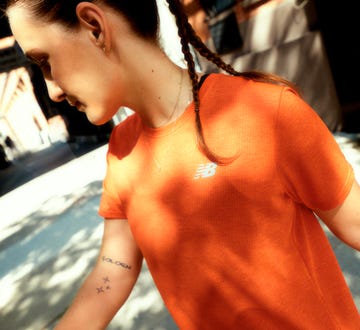When most people scope out a new gym, they tend to focus on the quality of the equipment, range of class offerings, and amenities in the locker room. Alison Feller, however, wants to know about the bathrooms. “I go to Orangetheory because they have three,” she says.
Feller has Crohn’s disease, so knowing that there are plenty of restrooms nearby is pretty important. During a flare, patients often have frequent diarrhea, rectal bleeding, and fever. Pain, fatigue, and weight loss are common, too, according to the National Institutes of Health (NIH) and the Mayo Clinic.
Although every patient is different, Feller, who was diagnosed at age 7, finds that living with the inflammatory bowel disease means dealing with extremes. “I either feel amazing or I’m flaring and feeling horrible,” she says. “There’s really no middle ground.” Equally frustrating? When she’s having a flare, she never knows when it will end. “I’ve had flares that lasted two weeks and flares that lasted two years.”
Living with Crohn’s
When Feller’s in the midst of a flare, mornings are especially rough. She’s often stuck sitting on the toilet or really close by for fear that she won’t make it back there in time. “Few things in life are more discouraging, disheartening, and embarrassing than having a toddler-style accident in my own apartment, steps from my own toilet,” she writes on her blog. “Nutrition - Weight Loss.”
Feller says that the messy accidents—coupled with the physical discomfort and unpredictable nature of her condition—often get her down, and have caused her to struggle with bouts of depression on and off throughout her life.
But overall, she’s thriving. Not only does Feller frequently visit Orangetheory near her home in New Jersey, but in the past 10 years, she’s also crossed the finish line of seven marathons. She’s completed 29 half marathons and tons of shorter races in that time span, too.
How can a person who’s sometimes afraid to leave her apartment to take her dog for a short walk manage to run up to 26.2 miles? It comes down to a love of exercise, a willingness to be flexible, and a commitment to not beat yourself up when things don’t go exactly as planned.
Staying fit
Feller’s love of exercise began as a child when she took up dancing. She started running in 2008, and a year later she ran a half marathon that allowed her to raise money for the Crohn’s & Colitis Foundation. “I signed up for the Team Challenge program, so I was training with others who either had Crohn’s or colitis themselves or had some sort of connection to it,” she says.
Training with people who were well-versed in inflammatory bowel disease alleviated a lot of the anxiety she previously had about running with a group. “The very first thing the coach did was show us where the bathrooms are, so I didn’t have to worry about being ‘that girl’ who's always asking,” Feller tells Prevention.
Her favorite race? The New York City Marathon, which she’s run three times—twice while she was having a flare. Feller has lived in the New York metro area for about a decade, and marathon day is her favorite day of the year. “The marathon draws a palpable energy from runners and spectators alike, and offers incredible views of the skyline,” she says. Plus, the bathroom situation is on point. “There are porta-potties every mile. If you’re going to run a race during a flare, New York City might be the best place to do it!”
Feller still plans to run marathons, but only when she’s feeling healthy. “If I have to stop every mile to use the bathroom, I’m going to get stressed out and not enjoy it,” she says. “Running is great for me, emotionally. It gives me life when I don’t have a lot left; it makes me feel human. But sometimes I’ve pushed myself too hard. I’ve been trying to listen to my body more and think about what serves me today. If that’s going for an eight-mile run, great, but if it’s sitting on the floor of my bathroom, that’s okay, too.”
It took Feller a while to not let the disappointment of missing a workout or race get her down, though. “I’ve spent so much money on races I’ve never run. Now, I try not to sign up until the night before. But with some of the bigger races that's not possible—you have to commit a year in advance.”
Still, Feller has bigger things to worry about than losing registration fees—namely, her health and her growing family. Her daughter, Annie, was born last fall. She’s also busy hosting a podcast and working as a freelance writer. And, of course, you’ll often find her running, practicing yoga, taking classes at SoulCycle, and working out at Orangetheory. In other words, she doesn’t sit still unless she has to.
Feller’s tips for working out with Crohn’s
Feller doesn’t think that everyone with Crohn’s has to be as active as she is, but she believes that finding some means of regular exercise is crucial to both mental and physical wellbeing. “It doesn't have to be running. There are so many options,” she says. “It’s easy to find something that’s a fit for you physically and that you find emotionally rewarding. It might be as simple as doing yoga in your living room.”
She also advises others with Crohn’s to take it day-by-day: “My doctor has told me to do what feels good, and I realized that I’m the only one who can be the judge of that.” (Of course, you should always check with your doctor to make sure that any exercise you’re considering is safe for you.)
“It’s normal to be afraid to even try, because your body may hold you back,” Feller says, “But I believe that mental barriers are our biggest obstacles.”














